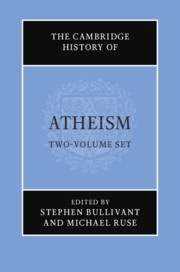Book contents
- The Cambridge History of Atheism
- The Cambridge History of Atheism
- Copyright page
- Dedication
- Contents
- Acknowledgments
- Contributors
- Introduction
- Part I Preliminaries
- Part II Atheisms in History
- Part III Reformation, Renaissance, Enlightenment
- 10 Reformation
- 11 Early Modern England
- 12 Spinoza and the Low Countries
- 13 Seventeenth- and Eighteenth-Century France
- 14 The Scientific Revolution
- 15 The Scottish Enlightenment
- 16 Al-Ghazālī
- 17 Lives of Jesus and Historico-critical Skepticism
- Part IV Classical Modernity: Philosophical and Scientific Currents
- Part V Classical Modernity: Social and Political Currents
- Part VI Twentieth and Twenty-First Centuries: Intellectual and Artistic Currents
- Part VII Lived Atheism in the Twentieth- and Twenty-First Centuries: Case-Studies
- Part VIII Emerging Atheisms in the Twenty-First Century
- Part IX Conclusion
- Index
- References
17 - Lives of Jesus and Historico-critical Skepticism
from Part III - Reformation, Renaissance, Enlightenment
Published online by Cambridge University Press: 25 September 2021
- The Cambridge History of Atheism
- The Cambridge History of Atheism
- Copyright page
- Dedication
- Contents
- Acknowledgments
- Contributors
- Introduction
- Part I Preliminaries
- Part II Atheisms in History
- Part III Reformation, Renaissance, Enlightenment
- 10 Reformation
- 11 Early Modern England
- 12 Spinoza and the Low Countries
- 13 Seventeenth- and Eighteenth-Century France
- 14 The Scientific Revolution
- 15 The Scottish Enlightenment
- 16 Al-Ghazālī
- 17 Lives of Jesus and Historico-critical Skepticism
- Part IV Classical Modernity: Philosophical and Scientific Currents
- Part V Classical Modernity: Social and Political Currents
- Part VI Twentieth and Twenty-First Centuries: Intellectual and Artistic Currents
- Part VII Lived Atheism in the Twentieth- and Twenty-First Centuries: Case-Studies
- Part VIII Emerging Atheisms in the Twenty-First Century
- Part IX Conclusion
- Index
- References
Summary
Historical critical biblical scholarship, particularly as it pertained to the study of the historical Jesus and the many “lives” of Jesus that were published and that popularized this scholarship, contributed to the broader skeptical culture of the radical Enlightenment. Although in this chapter I will refer to the radical more skeptical Enlightenment as “Enlightenment,” in reality we could speak more accurately of several “Enlightenments,” including Catholic, Jewish, and other religious Enlightenments that all occurred from the seventeenth through the nineteenth centuries (Brown 1990, 286; Hess 1999; Sorkin 2008; Lehner 2010, 166–78; 2016). The more radical form of the Enlightenment was marked by its skepticism, and this skepticism spread outside of academic circles to a more popular audience, not least by way of the popularizations of more skeptical biblical scholarship in works like David Friedrich Strauss’ famous 1835 Life of Jesus.
- Type
- Chapter
- Information
- The Cambridge History of Atheism , pp. 308 - 326Publisher: Cambridge University PressPrint publication year: 2021



